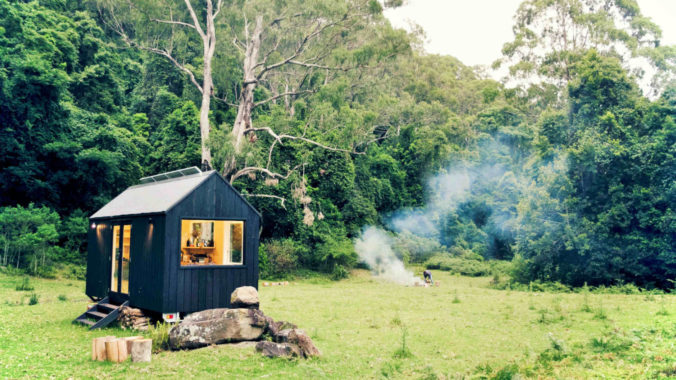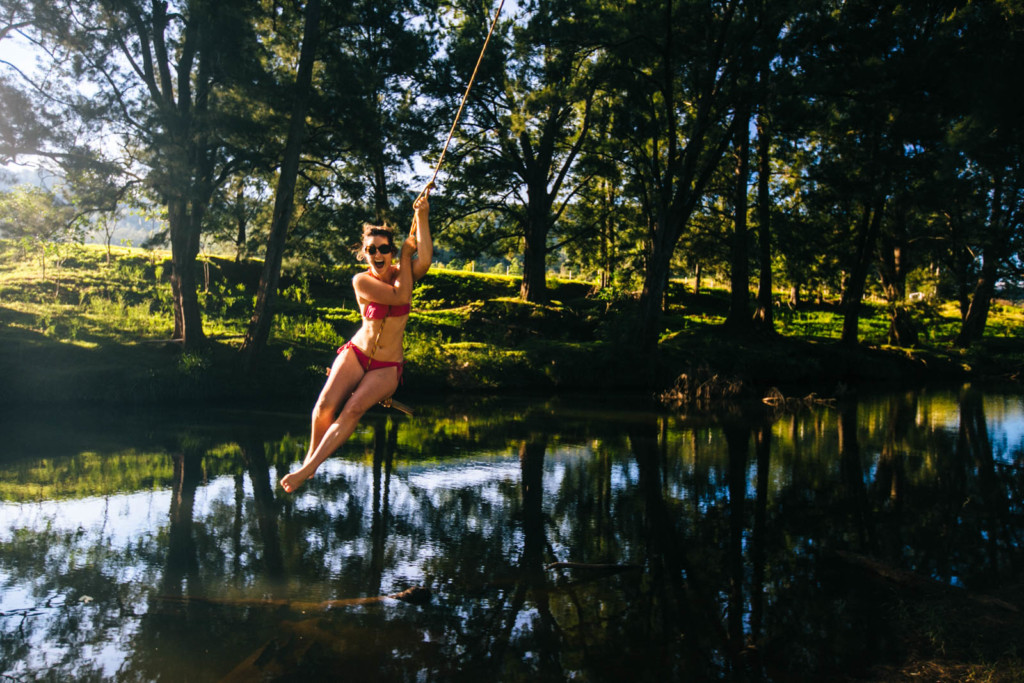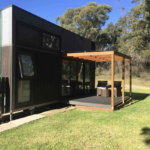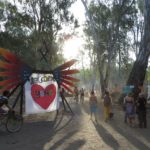So, you could put your savings into a mortgage and work the rest of your life to pay it off, or build a tiny house – a small cheap sustainable home – and have heaps of time to do what the hell you want, with very few living costs. Ummmm let me think…
According to a documentary I watched called ‘Small Is beautiful’, tiny houses tend to be under 300 sq feet, and they’re often on a trailer so they can move around. The tiny house ‘movement’ has become so big there are whole networks and communities based around it.

An Aussie startup called Unyoked hooks people up with trendy tiny holiday homes (above). You know the kind – glamorous sheds (there’s an oxymoron!) with wood-panelled walls, a few scandy-lookin’ furniture items, a succulent plant, some nice art on the wall…they’re kind of glorified contemporary caravans or trailer homes. I love them!
“Tiny house living is about living in and out” according to one of the tiny house owners on the doco. In warm climates you can just expand your living area to include the space surrounding the house. The freedom to move around is a real draw…you could escape the winter and move north, or make use of land while it’s available….or do house sits.

Life of freedom or lifetime of mortgage?
I suspect the real appeal beyond their cute size is in the financial freedom tiny houses represent. They’re a major life hack. One of the biggest financial burdens we have is the ongoing cost of living. Most of us only really work full time in order to pay our rent or mortgage. It feels like the odds are stacked against us in expensive cities like London and Sydney. We spend most of our lives working to save for, then pay off a mortgage.
The cost of a traditional bricks and mortar house including materials and labour is sky high, even if done independently. Tiny houses are part of a growing disruptive movement in construction and housing. Mod houses, kit houses, pre-fabricated and even self-‘printing’ houses built by robots are bringing quicker and cheaper options.

Once you have a place to live which you own, you have a lot of freedom. Unless you have very expensive tastes or a big family, you probably don’t need to work full time. This is part of the reason I’m so interested in eco houses. Once you tick the major ‘need’ boxes – house, power generation, food, you hugely reduce the amount you need to earn. And hence the time you spend working. You therefore have a lot more freedom to spend time as you please. I’d use the time to create multiple revenue streams such as freelance digital marketing, painting and setting up eco accomodation to rent out.
If you think about what you need from a home, it’s actually the functionality and location that’s most important. Somewhere to sleep, cook and hang out that keeps you warm and dry. Tiny houses can be key to real freedom, both financial and time-wise.
Tiny houses are ideal for slow travel and digital nomadism
Imagine being able to travel around with all the comforts of staying in your own home! It makes slow travel a lot more achievable, staying in different places for long periods. If you have a location independent job it would be ideal. The tiny house movement is like a modern re-invention of being semi-nomadic…hipster gypsies! It’s fascinating sociologically and seems like the start of a real shift in how we live to more sustainable, affordable and adaptable means.

Tiny designer houses
The beauty of tiny houses is that they can be nicely decorated with minimalist principles and a few quality items. Not many people would be tempted to live in a smelly old shed or skanky trailer. The increasing availability and exposure of cool aesthetically pleasing tiny houses is speeding up the movement. There are some great examples of beautifully kitted out tiny houses which make the whole idea far more aspirational.
Building vs buying a tiny house
Imagine designing and building your own tiny home exactly as you want it. There would be so much satisfaction once it’s done. When it comes to building it would not be straightforward but obviously that’s part of the reward; designing your own living space and seeing the end result. I kind of like the idea of living in a small simple kit home or premade one just to try it first then I’d know what I want.
But the idea of a custom home that’s been lovingly crafted from wood isn’t comparable to a pre-fab chip-board jobby… I guess both have pros and cons. A happy sustainable medium is what’s needed. Perhaps a customisable pre-fab option.
One of the tiny home owners in the doco explains “Knowing they’ve built it they know how to fix it. Buying a second-hand RV it could go wrong”
A master craftman in Japan built an amazing tiny home on wheels from wood. Explaining his choice of material he said “plastic and other man-made materials create unnecessary garbage. Garbage that can’t be returned to nature becomes an unnecessary burden on future generations. “It’s important to me to use materials that don’t create unnecessary garbage for future generations.” Nicely put!
He designed it so it feels like the outside environment comes into the living space. The whole thing opens up so it doesn’t feel small.
Do tiny houses need to be so small?
The size makes the homes portable, cheaper and easier to manage. A tiny home owner from the ‘Small is beautiful’ doco explains how she likes knowing where stuff is. There’s also a freedom from owning less in line with minimalist principles.

However, I wonder if living in a confined space would drive you (and whoever you lived with) crazy. Adapted versions of tiny house living seem more compelling than living solo in a tiny home. A community with different communal areas as well as private. For example perhaps a few communal kitchens and living areas like the open air kitchens in Bali….and separate outdoor bathrooms for each house.
I have always loved the idea of trying out living in a tiny home. I mean, I sort of did it when living in a basic hut in outback Australia for three months a while back, and loved it. I do wonder if other building methods could offer similar rewards but more space though. An ideal set-up for me would be to own some land with all the infrastructure, a few buildings and a garden, where I could keep a tiny home and up and leave when I feel like it, renting out the other spaces.
As one tiny home owner says “There’s a hook in there that attracts people… Frees them up for what they wanna do in life”
A friend of a friend of mine has built a tiny home on a trailer up in Canberra, and I’m super keen to go and check it out.
Watch this space…








Great site!
Thank you 🙂
this is such a great site! it has helped me in life to figure out some choices. I am happily living in a tiny home with 2 kids.
Thanks Jamanda that’s so great to hear!